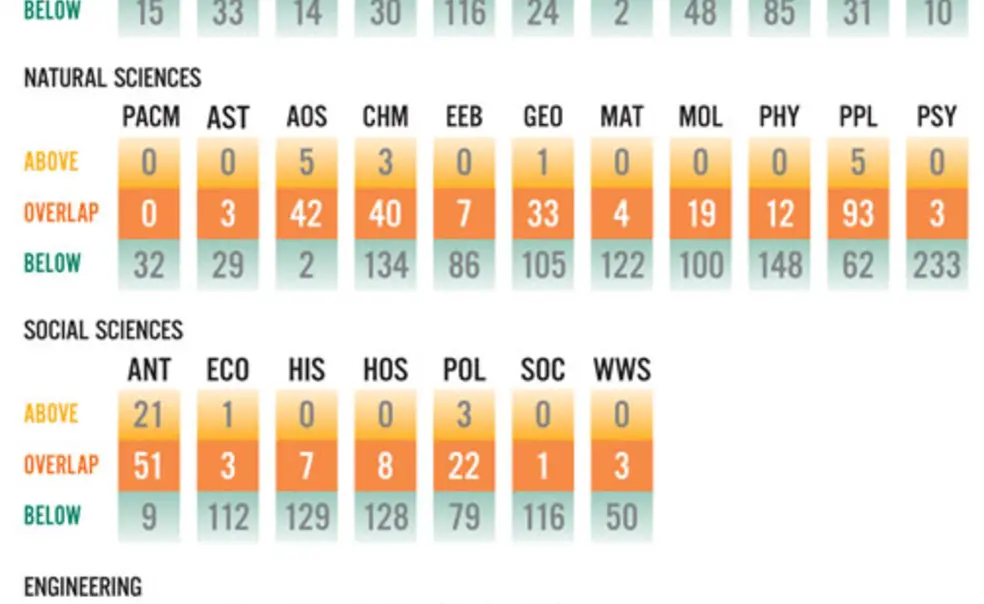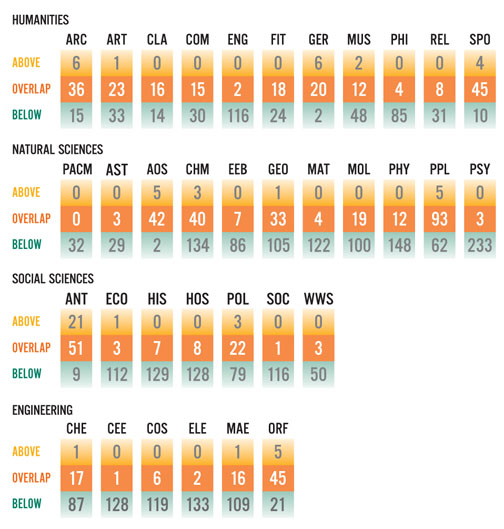Doctoral programs earn high marks in new study
A national assessment of doctoral programs released Sept. 28 ranked Princeton as a leader in graduate education, but the complexity of the findings makes it difficult to say who is the best in a given field.
The National Research Council gathered information from 212 universities in the United States. Princeton officials said that 21 of the University’s 35 programs evaluated by the NRC were ranked “at or very near the top of their field.”
The NRC developed two separate ranking systems that relied on different methods of determining what faculty believe are the most important characteristics in their field: the S (or survey-based) ranking asks faculty to rate 20 different pieces of data and weights them accordingly; the R (or regression-based) ranking weights the data based on how faculty rate a sampling of programs in their field. The S-rankings tended to give the most weight to faculty research activities, while the R-ratings gave substantial weight to program size.
The resulting rankings, the NRC said, are given in ranges rather than as single numbers, “to reflect some of the uncertainties inherent in any effort to rank programs by quality.” The report is based on information collected in 2006–07.
Six of Princeton’s programs — applied and computational math, psychology, electrical engineering, mathematics, computer science, and the Woodrow Wilson School — received top rating ranges, with a ranking between 1 and 4 on both the S and the R rankings.
Nine programs had top ratings of between 1 and 4 on one of the two rating scales: astrophysical science, civil and environmental engineering, ecology and evolutionary biology, economics, English, history, philosophy, sociology, and French and Italian.
The programs in East Asian studies, Slavic languages and literatures, and Near Eastern studies were not ranked because of their small size. In addition, Princeton’s doctoral programs in neuroscience and quantitative and computational biology were not assessed because they were created after the survey data was collected.
William Russel, dean of the graduate school, said the NRC report showed that “our programs in general are very highly respected. But the complexity of the methodology and the lag since the data was gathered has muted the reception by the faculty.”
The report should help students make more knowledgeable choices about graduate-school options, he said, and will give departments more specific information that can be compared with their peers.
Princeton’s top-rated programs had reason to celebrate. “We are very gratified by our top ranking,” said Deborah Prentice, chairwoman of the psychology department, “both because of what it says about the quality of our graduate program and because it will enable us to continue to attract the best students.”
The last NRC study of doctoral programs was released in 1995. Of the 29 Princeton programs evaluated in that report, 16 ranked in the top five and 24 in the top 10.
Source for chart: Office of the Provost/Institutional Research
This chart shows how 35 of Princeton’s doctoral programs compare with others in their field, based on their S-ratings range in the NRC report. Numbers in the orange boxes show how many other programs overlap with Princeton’s ratings range. Those in the yellow boxes show the number of programs whose ranges are completely above Princeton’s; those in the green boxes show how many are completely below Princeton’s.
KEY TO PROGRAM ABBREVIATIONS:
ANT Anthropology
AOS Atmospheric and oceanic sciences
ARC Architecture
ART Art and Archaeology
AST Astrophysical sciences
CEE Civil and environmental engineering
CHE Chemical engineering
CHM Chemistry
CLA Classics
COM Comparative literature
COS Computer science
ECO Economics
EEB Ecology and evolutionary biology
ELE Electrical engineering
ENG English
FIT French and Italian
GEO Geosciences
GER German
HIS History
HOS History of science
MAE Mechanical and aerospace engineering
MATMathematics
MOL Molecular biology
MUS Music
ORF Operations research and financial engineering
PACM Applied and computational mathematics
PHI Philosophy
PHY Physics
POL Politics
PPL Plasma physics
PSY Psychology
REL Religion
SOC Sociology
SPO Spanish and Portuguese
WWS Woodrow Wilson School













No responses yet